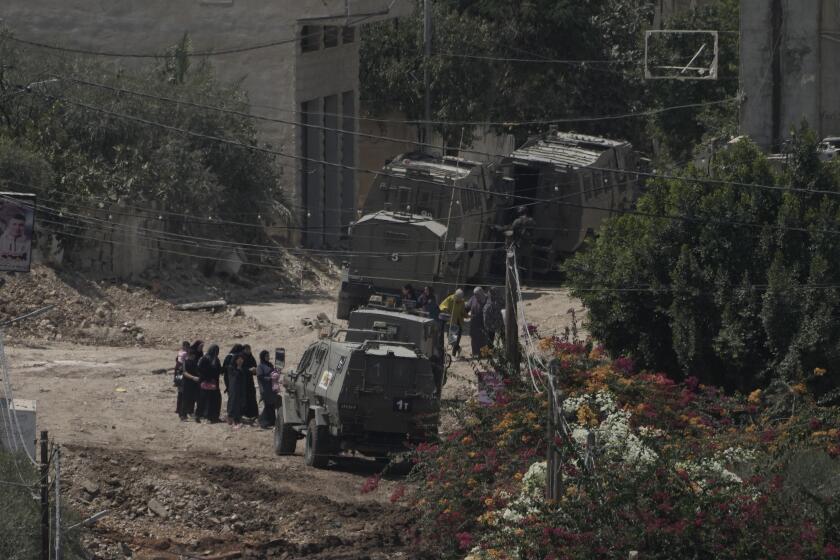Egyptian Troops to Stay in Kuwait : Mideast: The decision to remain in the security force is expected to reduce pressure on Washington to delay the final pullout of U.S. ground forces.
Egyptian leaders, reversing an earlier decision to bring home their troops from the Persian Gulf, have struck a broad agreement under which Egypt will provide combat troops to a Mideast security force in Kuwait, officials said here Sunday.
American Defense Secretary Dick Cheney, in Cairo for discussions with Egyptian officials, was told in meetings with Egyptian President Hosni Mubarak that an accord is about to be completed.
That news came just three weeks after Mubarak had announced that he would withdraw Egyptian forces from Saudi Arabia and Kuwait--a move that appeared to herald the breakdown of an Arab consensus on postwar security arrangements.
Cheney has said repeatedly during his visit here that Egypt’s continuing participation in the postwar security arrangements is essential. But until now, officials said that an agreement has been stymied by disorganization among Kuwait’s leadership and Egyptian qualms about the financial terms under which it would assist Kuwait militarily.
Still, once the accord is made final, Egypt is expected to bring home the bulk of the 36,000 troops it sent to Saudi Arabia, leaving a smaller force in place in Kuwait. Like the United States, Egypt does not want permanent bases in the region, but a steady presence made up of troops that would rotate through Kuwait.
Egypt’s decision to keep troops in the Kuwait security force is expected to reduce pressure on the United States to delay the final departure of U.S. ground troops from the region.
After Mubarak announced his plans in early May to bring all Egyptian troops home, the United States had to change its plans to withdraw all U.S. troops quickly. Cheney responded to the move by announcing that 4,000 to 5,000 U.S. troops would stay in Kuwait until September.
On Sunday, Cheney continued to press Egyptian leaders to support the Bush Administration’s recently unveiled arms control initiative. Cheney met with Egyptian Foreign Minister Amir Moussa, who said Egypt “continues to support a process of arms control, especially insofar as the weapons of mass destruction are concerned.”
Egyptian leaders have told Cheney that they are particularly eager to ban nuclear weapons, in which Israel is believed to have a monopoly in the Mideast.
Cheney also traveled Sunday to the Sinai Peninsula, where he visited the main base of the Multinational Force and Observers, which oversees the Egyptian-Israeli peace accord.
Cheney called the 11-nation, non-United Nations peacekeeping force “a model that we might look to and (that) perhaps could be replicated in other parts of the Middle East” if peace agreements can be struck between Israel and its other neighbors.
Cheney on Sunday continued to fend off suggestions that the Bush Administration is indulging in arms control rhetoric while arranging for business-as-usual arms transfers to Washington’s friends in the region.
“There is no contradiction between, on the one hand, suggesting that it is time to try to rein in the accumulation of vast quantities of arms in certain portions of the region, to halt the proliferation of weapons of mass destruction while at the same time satisfying legitimate security needs of our friends,” Cheney told the U.S. Chamber of Commerce in Egypt.
A senior U.S. official said Sunday that the Bush arms initiative is designed in part to force the world’s top arms suppliers, including the United States, to draft a consensus on what security needs potential Mideast arms buyers legitimately have.
More to Read
Sign up for Essential California
The most important California stories and recommendations in your inbox every morning.
You may occasionally receive promotional content from the Los Angeles Times.







